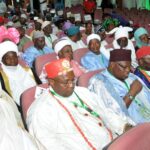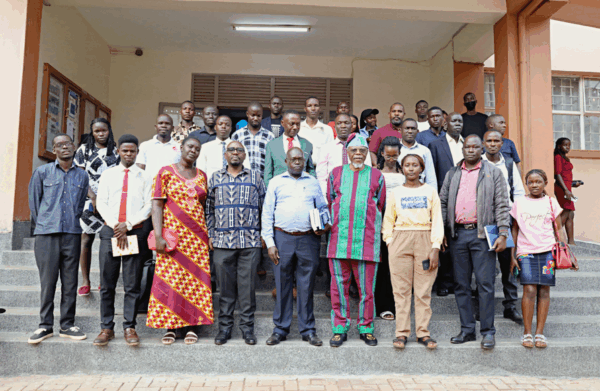
Local Government Financial Autonomy Bill in the light of 2014 CONFAB’s Polycentric Solution
May 22, 2024
Our Shameful Contradictions and Coloniality
May 22, 2024The debate over the establishment of state police has reignited. Whilst proponents, including the federal government, argue for its crucial role in tackling the nation’s worsening security challenges, staunch critics, including the Inspector General of Police (IGP), are concerned about political abuse and manipulation. This contradiction, which is invariably connected to other constitutional issues such as local governments (LGs) financial and legislative autonomy and resource control, is a manifestation of a larger systemic dysfunction which are already resolved in the polycentric recommendations of 2014 National Conference (CONFAB).
Whilst President Tinubu constituted a committee which includes the governors to explore how state police could address the worsening security situation that had defied various measures, on February 15; the police bill, sponsored by Benjamin Kalu (Deputy Speaker) and 14 others, passed the second reading in the House of Representatives (HoR) on February 20, 2024. This same bill had failed in the 8th and 9th National Assemblies (NASS). Amongst other things, the bill amends the constitution by putting the police, now in the Exclusive Legislative List, on the concurrent list, making it possible for 36 state governments too to have distinct police services, with uniform standards and disparate Commissions.
Also, the bill protects the state police from unwarranted interference from the federal police and ensures Federal government to provide grants and aids to state police through the NASS. However, according to the work plan of the related HoR committee it’s actualization would take two years. This would entail meetings with stakeholders, traditional rulers, civil society groups, leaders of faith-based organizations and especially the state governors to seek their support for the passage of the controversial local government autonomy bill, as most state House of Assembly (HoA) had made the state police bill as a condition to passing the local government autonomy bill.
In one of those meetings, one-day National Dialogue, organized by HoR on April 22, 2024, the debate on the pros and cons erupted into a national debate. I would here identify the pros and cons, as identified during this meeting, in addition to other related debates, especially the 2014 CONFAB (p.255-259).
Those who support argue that state police would secure; (a) local intelligence gathering and rapid response since localized police force with intimate knowledge of the terrain, local languages and communities would be better equipped to conduct operations; (b) enhanced community policing towards justice and security, and building trust; (c) increased responsiveness of the state governments to the security challenges; (d) reduction of burden on federal resources as the localized approach would become more effective than the current centralized system, which often struggles to adapt to the local security challenges; (e) enhanced federalism and federal security architecture through cooperation between Federal and State Governments.
The advocates further argue that (f) the political abuse and manipulation of the police is applicable to both the federal and state governments revealing a broader systemic problem that needs addressing; (g) Inability of NPF to effectively tackle insecurity, caused by Islamists, bandits, Fulani herders, gunmen, kidnappers, oil thieves, cultists and robbers questions the integrity of the NPF; (h) And lastly that states already funding the NPF, and this demonstrates their commitment to improving security.
The former president Goodluck Jonathan noted that the internal security challenges cannot be managed without state police and that the State police should be created in a way that it cannot be hijacked by the political class. Furthermore, Jonathan argued that traditional institutions and royal fathers should be given roles to play and given roles towards maintaining peace and other withing the new state policing order.
Critics also argue that state police would lead to; (a) potential abuse of power by the state governments against political opponents, jeopardizing justice and security; (b) politicizing police forces in states by governors could worsen existing ethno-religious divisions and conflicts. (c) exacerbating existing ethno-religious tensions could lead to eventual breakup of the country; (e) financial and logistics challenges as only a few states could fund state police independently. This is evident in the passed police bill where these concerns are not adequately provided for by the federal government. (d) problems of over-arching national coordination in the absence of a centralized police force. (e) serious conflicts in operational jurisdiction between the Federal and State Police. (f) And ambiguities about the fate of police officers currently in NPF.
Kayode Egbetokun, the IGP, stated that Nigeria is not matured for state police, and would be abused by the state governors. He argued that challenges of effective policing should be addressed. Others also argue that the welfare challenges of the central police before adopting state police.
Furthermore, the police bill that is planned to take effect in two years has come under severe criticism. Ali Amodu, a former Assistant IGP, argues that the two-year process is oblivious of “security situation of the country.” David Oputah in Feb 2024 OrderPaper website noted that the bill lacks effective de-centralization. Firstly, governor is to appoint State Police Commissioner (SPC), Deputy and Assistant Commissioners, subject to confirmation by HoA, based on the advice of the Federal Police Service Commission. Same process is to be used to discipline and remove these officers. Secondly, NASS is to legislate the framework and guidelines for the establishment state police with no inputs from HoAs.
Braeyi Ekiye noted the dilemma in April 25, 2024; “the pros and cons of a state police in Nigeria are as convincing, so much so that, one is left in utter bewilderment, and in a state of helplessness likened to being between the devil and the deep blue sea.” Yet, there is no dilemma here but contradictions when one understands the role of polycentric governance in a federal matrix.
Polycentricity is a term appropriated by Vincent Ostrom and the Bloomberg School whilst defending the traditional American LG inspired by Alexis de Touqueville’s observation of the American LG system in his Democracy in America. There are 3 basic elements of polycentricity. First is the existence of many centers for decision making. The second is the existence of a single system of rules (be they institutionally or culturally enforced). And the third is the existence of a spontaneous social order as the outcome of an evolutionary competition between different ideas, methods, and ways of life. The third makes way for choice; exit from a local government, the creation of a new one or joining another.
Aside from the federal and 50 State governments, the US has 90,837 LGs according to the last 2022 census. These polycentric LGs, including county, township, municipal, independent school districts and special-purpose entities, enjoys substantial autonomous of not only determining its own budget without directly control by a parent government, but also in creating and funding their own police. The US, with its diverse and complex security landscape, offers a compelling example of the effectiveness of state and local police forces. Each state has its own police department, tailored to the specific needs and challenges of its communities, demonstrating the adaptability and efficiency of decentralized policing.
Fortunately, the contradictions over the police bills are resolved by the 2014 CONFAB through the tacit accommodation of polycentric governance. On the existence of a single system of rules, the CONFAB proposes that the Federal Police should have a clearly spelt out matters and offences; Police Service Commission should employ federal character in recruitment and the membership should be apolitical and morally inclined; Funding of the federal police should be enhanced and Police Trust Fund Act would complement this funding; and several others resolutions focused on the standards and general welfare of the police with respect to their expansion, equipment (arms, ammunition and communication), training, trainers.
On the existence of a spontaneous social order, the CONFAB proposes that states too could establish, fund and control state police; and State Law may also provide for Community policing which makes local government police possible. On the first polycentric element; the existence of many centers for decision making, the CONFAB proposes enormous responsibilities for the indigenous rulers and polities in the policing the borders (pp.114, 251), conflict resolution (p. 92), screening and vetting prospective police recruits (p.259) … and so on. This is also supported by President Jonathan as stated above. But whilst the CONFAB does not clearly constitutionalize the indigenous polities towards the existence of many centers for decision making, the Conference clearly points to it. These enormous responsibilities cannot be successfully achieved without constitutionalizing the indigenous polities.
This leads us another Nigerian contradiction of “two publics,” well captured by Peter Ekeh. This entails the fracturing of the public into two; the constitutionally excluded moral and primordial public, and the powerful amoral civil public that took over from colonial masters. As Ekeh noted, this is absent in the West. This amoral public is unfortunately the despicable spring of unresponsively corrupt pan-tribalists and prebendalists, and the genesis of all our security and developmental challenges. Polycentricity would not work if the two publics are not de-colonized into one single polycentric public within every local government, where both the democratic public and the primordial public would constitute two complementing centers for decision making.
See also : Polycentricity and De-colonizing the Two Publics
As we have seen, the issue of state and community policing is intricately connected to the larger concern for restructuring. The major contradiction here is the adoption of a federal system without polycentricity, as practiced in US, and other democracies, as well as non-democracies like China. Over-centralization must give way to decentralization, bottom-up approach that empowers local communities and leverages their knowledge and understanding of their unique circumstances. The willingness to explore alternative models of policing are crucial to finding solutions. These would allow for tailored strategies, improved accountability, and a more responsive security apparatus capable of effectively addressing the diverse threats facing the nation towards the Nigerian Dream and African renaissance





